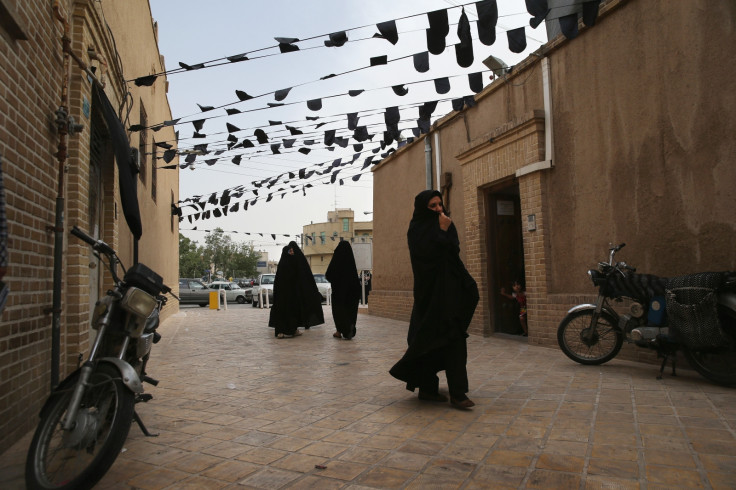Sweden's 'feminist government' wearing hijabs in Iran is a joke – they are bowing down to oppressors
Swedish officials chose to adhere to a custom which is seen as a symbol of oppression for Iranian women.

Over the weekend, Swedish Prime Minister Stefan Löfven led a delegation of lawmakers to Iran. Of the fifteen participants, eleven were women. It could have been the perfect opportunity to demonstrate the positive role women can play in society in a country where women's rights are severely restricted.
But instead of showing solidarity with their oppressed sisters – as it would be expected of true feminists – Sweden's self-declared "first feminists government in the world" chose to adhere to a custom which is the ultimate symbol of the oppression Iranian women are subjected to since the Islamic Revolution in 1979: the compulsory hijab.
In the aftermath of Ayatollah Khomeini's rise to power, thousands of Iranian women poured into the streets protesting against the denial of their basic right to choose what to wear. "Bring down the tyrant!" they chanted.
Ever since, courageous Iranian women have risked their lives confronting the theoretic fascist elite that have forced them into cruel submission in an attempt to reclaim their dignity.
Imagine how these women must have felt – deprived of all choice – when a Swedish delegation of female lawmakers, independent and successful women with all options available to them, chose to bow to the demands of their oppressors.
Look no further for an answer than to Masiah Alinejad, an Iranian activist who started a campaign that invites Iranian women to share photographs of themselves without hijab.
"European female politicians are hypocrites," Alinejad said. "They stand with French Muslim women and condemn the burkini ban – because they think compulsion is bad – but when it happens to Iran, they just care about money".
And she is right. To see the Swedish female lawmakers paraded in front of Iranian President Hassan Rouhani was a sickening, vomit-inducing spectacle. It was the epitome of betrayal towards the spirit of feminism. It made a grotesque mockery of Stockholm's promise to "ensure that a gender equality perspective is brought into policy-making on a broad front, both nationally and internationally".
With no sense of irony, Sweden's Deputy Prime Minister Isabella Lövin recently took to social media to mock US President Donald Trump on charges of sexism and misogyny for a photo which showed him signing an order against abortion in a room full of men. Lövin posted a photo of her signing a new climate law, surrounded by female staff.
Unfortunately, Sweden's "feminist government" did not have the integrity to apply the same standards to Iran, a country that practices one of the purest forms of gender apartheid in the world.
In Iran, the religious police harass women in the streets for wearing the wrong kind of hijab. Women are not allowed to leave the country without the permission of their father and husband. They are banned from sport stadiums. They face imprisonment or death when they report rape or adultery. The list goes on.
But instead of highlighting their plight, Sweden's female lawmakers smiled as they signed several contracts with the Islamic Republic and hid behind the pitiful excuse that they were just respecting the norms of the country.
What they actually meant was that they were giving in to a culture of oppression, nurtured by the bigotry of low expectations: The idea that standards must be lowered when brown people express any misogynistic views and that Muslims, or people of colour in general, must be judged on different merits. After all, it is their culture, right? Better not to challenge it. That is bad for business.
It is this twisted way of thinking that created an environment in which Western feminists sell the hijab as a symbol of empowerment, while the deprivation of fundamental rights of Iranian women, and Muslim women everywhere – the right to choose what to wear – is ignored or, at worst, dismissed as 'Islamophobia'.
Of course millions of Muslim women choose to wear the hijab, and that choice must be respected. But many more women are forced to wear religious attire by totalitarian theocratic groups and regimes. It is a tool of oppression to show them their place. To condemn them to being second class citizens. To isolate them from society. To deprive them of their dignity as human beings.
The moment progressives, self-declared feminists and social justice campaigners, side with the oppressors and refuse to protest the crimes committed against their fellow women, they become the regressives of today. They fail the most important people in the Muslim world: the political activists, the journalists, and the human rights campaigners who risk their lives trying to make their societies more inclusive, more equal and, above all, more humane.
What a joke they are as feminists.
© Copyright IBTimes 2025. All rights reserved.






















